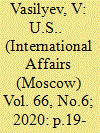|
|
|
Sort Order |
|
|
|
Items / Page
|
|
|
|
|
|
|
| Srl | Item |
| 1 |
ID:
155332


|
|
|
|
|
| Summary/Abstract |
This article examines processes that are increasing Japan's public debt and factors influencing them. It analyzes the main parameters of Japan's national financial system. Attention is paid to Japan-specific features of certain key budget and debt indicators.
|
|
|
|
|
|
|
|
|
|
|
|
|
|
|
|
| 2 |
ID:
174786


|
|
|
|
|
| Summary/Abstract |
This article provides an empirical approach to analyze the validity of the Ricardian equivalence (RE) theorem for China using time series data over the period 1990 to 2016. The results reveal that private consumption (c) has a long run relationship with tax (T), budget deficit (d), real interest rate (r), and government spending (G2). The empirical results exhibit that the coefficients of T, r, and d are negative and statistically significant which means that an increase in any of variable will reduce private consumption. The proposition of RE theorem holds that it is insignificant if budget deficit is financed by tax increase or debt issue, since under specific conditions, the impact of government consumption on total demand remains orthogonal to the method of financing budget deficit because rational economic agents consider todays deficit financing as tomorrows tax liabilities. The results of multicointegration estimation and rational expectations model invalidates the RE theorem in China. The rejection of the RE theorem for China is due to liquidity constraint, uncertainty which offsets consumption, and finite time horizons which invalidate the RE theorem.
|
|
|
|
|
|
|
|
|
|
|
|
|
|
|
|
| 3 |
ID:
117803


|
|
|
|
|
| Publication |
2012.
|
| Summary/Abstract |
The twin-deficits theory has intrigued economists and policy-makers alike for the past few decades. In a Keynesian economy, budget deficit increases the absorption of the economy, causes import expansions, and thereby, worsens the trade deficit. It also causes domestic interest rates to rise, domestic currency to appreciate, and thereby, contributes to trade deficits. However, according to the Ricardian Equivalence Hypothesis (REH), rising budget deficits imply higher future tax liabilities so people would save more and consume less. As a result, an inter-temporal shift between taxes and budget deficits would have no impact on the real interest, or the trade deficit. Thus, the issue of whether the twin-deficits phenomenon holds becomes more of an empirical question, and the recent fiscal expansions to curb recession makes it timely to revisit the phenomenon, especially for the developing countries confronting both the deficits on a chronic basis. To this end, we make a case study of India, using the bounds- testing approach to cointegration and error-correction modelling on monthly and quarterly data over 1998-2009. Our results suggest that the twin-deficits theory holds for India in the short-run (validating the Keynesian channel) but not in the long-run (validating the REH).
|
|
|
|
|
|
|
|
|
|
|
|
|
|
|
|
| 4 |
ID:
177524


|
|
|
|
|
| Summary/Abstract |
IN EARLY JUNE 2020, The National Bureau of Economic Research (New York), which is responsible for monitoring developmental cycles in the American economy, made the announcement that February 2020 had marked a peak in the American economy's latest climb, which began in June 2009 and continued for more than 10.5 years (128 months). This stretch of the American economy's growth has been the longest since such cycles started being observed and studied in 1854 [1]. Then, beginning in March 2020, primarily as a result of the coronavirus epidemic, the U.S. economy began a precipitous slide into economic crisis. And the first outcomes of the American economy's slide to the bottom immediately brought to mind the Great Depression of 1929-1939, because such indicators have not been marked since the end of World War II in the mid-1940s.
|
|
|
|
|
|
|
|
|
|
|
|
|
|
|
|
|
|
|
|
|